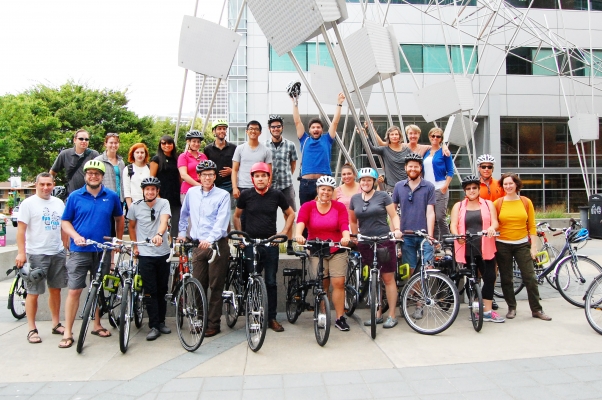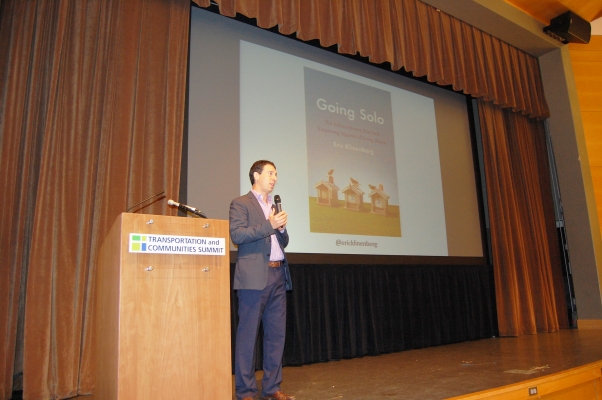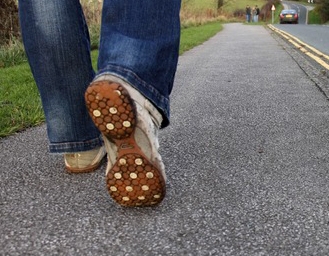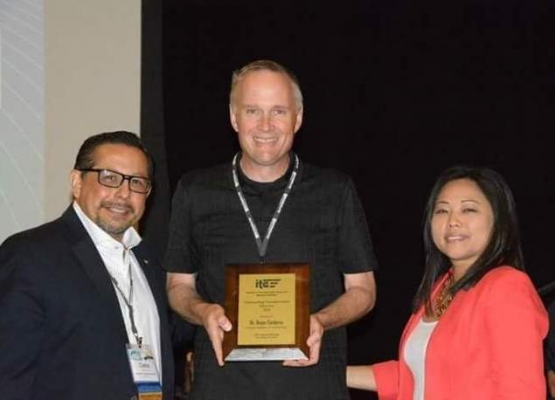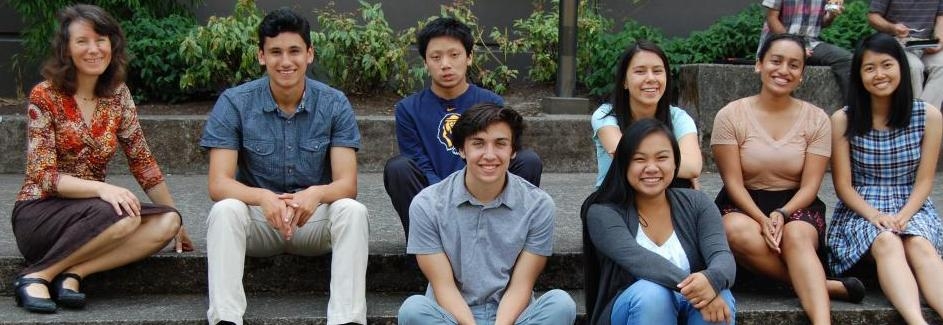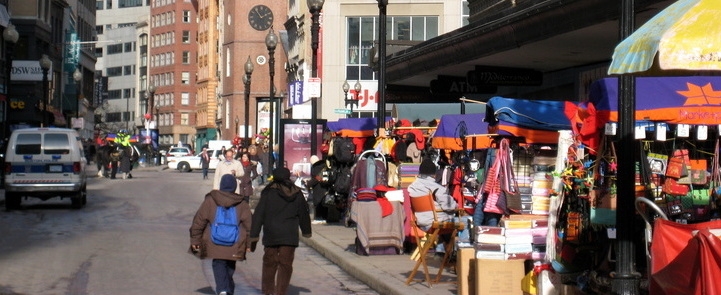Portland State University today achieved the highest ranking from the League of American Bicyclists' Bicycle Friendly University program. Portland State is now one of just five platinum universities recognized under the program.
Other NITC program campuses were also designated as bike friendly. University of Oregon achieved gold status and University of Utah, silver.
The Bicycle Friendly University program evaluates applicants’ efforts to promote bicycling in five primary areas: engineering, encouragement, education, enforcement and evaluation/planning, known as the Five E's.
The league noted that Portland State’s support for bicycling has helped reduce congestion, improve air quality and lower the demand for parking on campus. “Portland State encourages bicycling as an affordable, efficient option for transportation and provides amenities such as indoor bicycle parking, low-cost bicycle rentals, and an on-campus Bike Hub, where students can find everything they need to make bicycling a part of their commute options,” the league stated.
PSU previously was a gold-level bike-friendly university. In the past two years it expanded its “Vik Bike” bicycle rental program from 12 bicycles to 134. Each bike comes with lights, a lock and a helmet. The program, in which students can rent a bike for a term, receive training on bike commuting and bike maintenance, has a waiting list of participants.
During the...
Read moreThe latest report released by NITC offers a unique tool for communities: a guide to broadening residents’ knowledge about their transportation system and how to effect the changes they want to see.
Community involvement and outreach is an important part of any planning effort, but as planners often find, many times the conversation is a difficult one to carry on. Residents may lack the technical knowledge to understand the intricacies of the system, or they may show skepticism toward the planning process in general.
“Transportation Leadership Education,” a project by Portland State University research associate Nathan McNeil, offers a startup kit for communities to stimulate the development of a more involved, educated citizenry.
“One of the conventions has been that public involvement is based around a specific plan or a specific project. This approach is more proactive; it recognizes the value in having informed citizens... building up the civic infrastructure of people, knowledge and connections,” McNeil said.
For the past 24 years, the City of Portland and Portland State University have teamed up to offer a ten-week transportation education course, free of charge to community members.
The Portland Traffic and Transportation Course,...
Read moreThe first Transportation and Communities Summit picked up where its predecessor summit left off, offering a day of professional development opportunities and a few new touches. Around 275 people attended this year’s summit, held Sept. 15 at Portland State University.
The highlight for many, according to post-event surveys, was the keynote address by author and sociology professor Eric Klinenberg. Keeping alive a tradition from earlier Oregon Transportation Summits, Klinenberg’s address gave insight into an issue that intersects with transportation—in this case, the rise of single-occupant households—without directly detailing the transportation implications.
The breakout sessions allowed attendees to delve deeper into topics directly related to their professions. A full 54 percent of survey respondents called the breakout sessions the most valuable piece of the summit program. The most highly rated sessions were “Waiting to Connect,” on connected vehicles; “Something from Nothing,” on funding; “Zeroing in on Safety,” on Vision Zero; and “Baby, You can Drive my Car;” on the sharing economy.
Slides from all these presentations are available at the summit page.
For the first time, summit sessions were Webcast for those who couldn’t attend in person...
Portland State University and the city of Portland will partner on a series of “smart city” projects over the next year as part of a national MetroLab Network initiative, announced at the White House on Monday, Sept. 14.
PSU and Portland are among 20 city-university pairings throughout the United States taking part in the initiative, in which partners will research, develop and deploy innovative technologies to address challenges facing the nation’s urban areas.
The White House statement about the MetroLab Network was part of a larger event announcing other smart cities programs being launched on the federal level. The Smart Cities Initiative will invest more than $160 million in federal research and leverage new technology innovations to help local communities tackle key challenges such as reducing traffic congestion, fighting crime, fostering economic growth, managing the effects of climate change and improving the delivery of city services.
The projects that Portland State and the city will focus on center around Portland’s mass-transit system, including a new bus rapid transit line along the Powell-Division corridor that Portland and TriMet plan to put in place in 2019. PSU researchers will work with the city and other partners to test air quality and traffic along the corridor using the latest sensor technology. They also will use sensors and traditional surveys to collect data showing how the new rapid transit line affects...
Read moreNITC announces the opportunity to apply for awards to support small research development endeavors.
The purpose of these awards is to assist researchers who are interested in transportation but have not had an opportunity to undertake a small project that supports safe, healthy and sustainable transportation choices to foster livable communities. Individual awards cannot exceed $15,000. All grants require 1:1 match.
Proposals are due November 6, 2015.
Please visit the NITC website for more information.
Priority (not exclusive) will be given to:
- Applications from faculty who have not previously received an NITC grant.
- Applications from untenured faculty.
- Applications from research projects that are interdisciplinary.
Eligibility:
Faculty members and research faculty eligible to serve as Principal Investigators (PIs) at Portland State University, the University of Oregon, the Oregon Institute of Technology, University of Utah, or University of South Florida may submit proposals.
The National Institute for Transportation and Communities (NITC) announces the opportunity to apply for grants to support implementation or translation of research results.
- Activity aimed at assisting local agencies or partners in implementing research results. This can be in the form of an in-person workshop, on-line webinar, development of a “how to” or training video, handbook, guidebook, software/spreadsheet tools, etc.
- Refining or developing and disseminating tools that can be used by practitioners, students, or researchers to further the state of the practice.
Roger Lindgren, a professor of civil engineering at the Oregon Institute of Technology and a member of NITC’s executive committee, was recently awarded the Institute of Transportation Engineers (ITE) Western District Outstanding Transportation Educator Award.
He was presented with the award at the ITE Western District’s annual meeting, held this year in Las Vegas.
The group of Oregon Tech students who traveled to the meeting with Dr. Lindgren also competed in the student traffic bowl, where they made it to the final round and took third place out of 12 schools.
The success of the traffic bowl team is another indicator of the strength of Oregon Tech's transportation program.
The outstanding educator award is not an annual award. It is only provided in years when there is an outstanding recipient, someone who demonstrates extraordinary creativity in teaching and takes exceptional measures to spark student interest in the transportation profession.
Lindgren, known at Oregon Tech for his...
Read moreSeven dedicated students spent their summer days in TREC’s offices at PSU this year, working to transform the Bike-Ped Portal project from a dream into a reality.
TREC already houses Portal, a vast collection of Portland-area traffic and transit data, and NITC researchers saw a need for a database on the national scale for non-motorized transportation modes.
Research associate Krista Nordback launched the NITC pooled-fund project, Online Non-motorized Traffic Count Archive, with co-investigator Kristen Tufte in the spring of 2014. A year ago, Bike-Ped Portal was little more than an idea.
Now it contains roughly four million individual records of bicycle, pedestrian and even equestrian movements in five states.
High school interns Jolene Liu, Tomas Ramirez, Tara Sengupta, Gautum Singh, Kim Le, Max Fajardo and Kimberly Kuhn worked full time for weeks in order to convert piles of unsorted documentation into usable formats.
Nordback engaged the team of interns through Saturday Academy, a...
Read moreA NITC research project from Portland State University introduces a method of cleaning up land use data, for use in improved transportation models.
Transportation and land use are closely interdependent. Considerable work is underway, in Oregon and elsewhere, to develop models that integrate the two.
Planners creating these models often spend the bulk of their time preparing data on the various land uses. Many times the data, gathered from diverse sources, is incomplete and requires the planner to find missing information to fill in the gaps.
In fields outside of transportation, there have been considerable advances in techniques to do this. Data-mining and machine-learning techniques have been developed, for example, to systematically detect fraud in credit data, reconcile medical records and clean up information on the web.
In the transportation modeling community, by contrast, most efforts to tackle the problem are tied to a specific model system and a chosen study area. Few have produced reusable tools for processing land use data.
Liming Wang, lead investigator of the project Continuous Data Integration for Land Use and Transportation Planning and Modeling, offers such reusable...
Read moreOn creating civic engagement, driving density and sharing a stage with the 'funniest person on earth'
Our cities reflect how we choose to live. Increasingly, we choose to live alone.
Eric Klinenberg spent seven years researching people who live alone for his book “Going Solo: The Extraordinary Rise and Surprising Appeal of Living Alone.” Klinenberg will discuss the implications for the future of transportation as keynote speaker for the Transportation and Communities Summit on Monday, Sept. 15.
> More information on the Transportation and Communities Summit
> Register now!
Klinenberg, a sociology professor at New York University, came to the topic after an earlier investigation into isolation. Instead of a problem, however, he found the sort of vitality that drives civic participation.
People who live alone, Klinenberg said, make cities vibrant places by nourishing the “social infrastructure”: the places and institutions that support people’s public lives.
“When countries invest in public amenities, including transit, they make it easier for...

